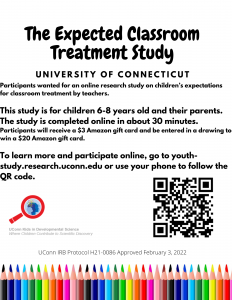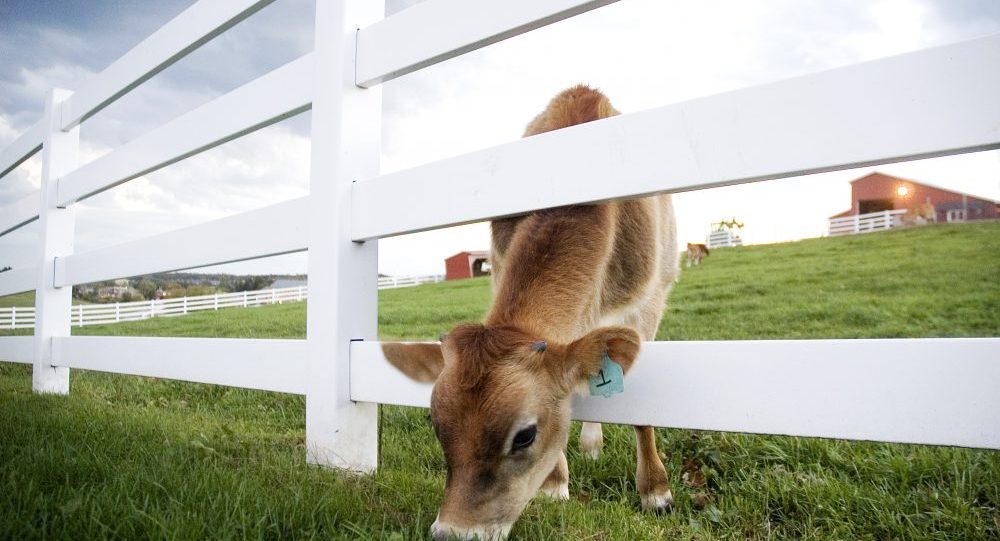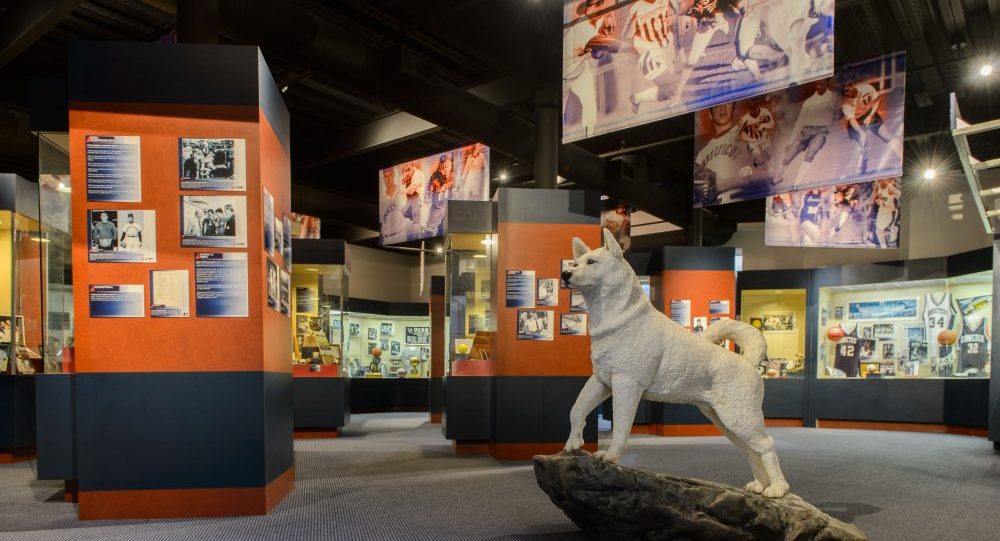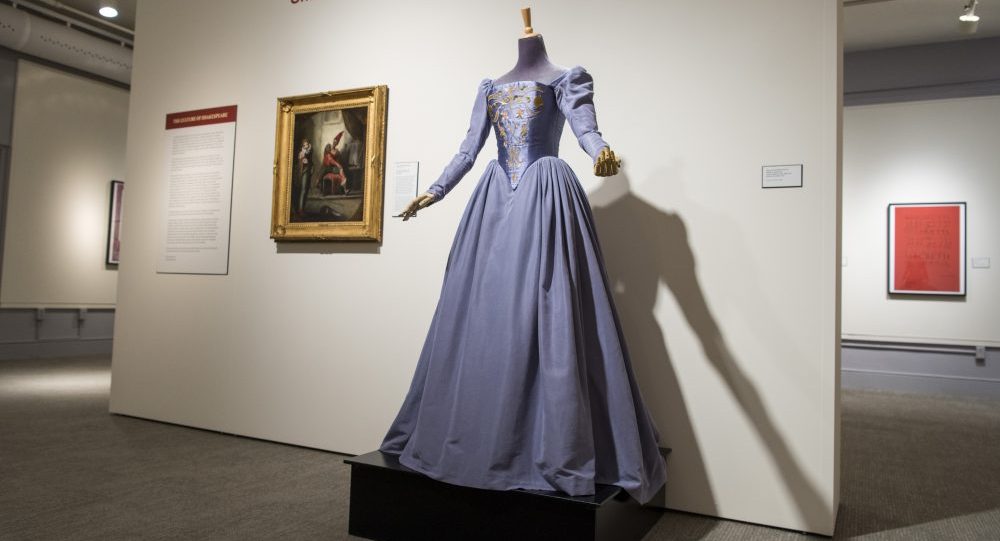Below are some examples of studies currently underway on the Storrs Campus.
Parents may express interest in a particular study by referencing the study's protocol number when joining the UConn KIDS database. Or, contact the Child Research Recruitment Coordinator.
Check back often as new studies get added throughout the year!
APPRISE Project
Department: Psychological Sciences
Protocol: H18-180
The APPRISE project is a tablet-based universal screener for young learners ages 4 – 8 to identify risk of learning difficulty, specifically dyslexia. The app is comprised of engaging games that measure both literacy and executive function skills. After it is validated, the app will be completely free (!) to users.
Researchers are currently looking for schools to participate in the 2019-20 school year. Students from grade PK through 3rd will complete some reading-related tests with a UConn teacher and try out the app games. Schools will receive a report with each student’s scores and within-school averages. Contact apprise@uconn.edu to learn how you can get involved. Visit us at appriseproject.org.
Behavioral and Affective Dysregulation: Course and Outcomes (BADCO) Lab
Department: Psychological Sciences
Protocol: H18-180
The BADCO Clinical Psychology Lab is seeking parents and children 8-12 to participate in the Feelings in Families Study. All kids get angry and irritable, but some kids feel like that a lot of the time. These feelings can make it hard to get through the day and can make relationships difficult.
This study will help us learn about:
- How children cope with feelings of frustration or anger
- How children’s emotions impact parent-child relationships
- How parents experience their own emotions
During a 2-hour appointment at the UConn Storrs or Hartford campus, you and your child will be asked to:
- Complete questionnaires about feelings and behaviors
- Complete activities and games on the computer
We are especially interested in families who have children who often feel angry or irritable, but our study is open to children without these difficulties as well. Your family may receive up to $50 for participating in this study.
If you are interested and would like more information, you can contact Dr. Jeffrey Burke or Olivia Derella at (860) 486-1129 or via email at feelingsinfamilystudy@gmail.com.
Infant Breastfeeding Behavior
Department: Nursing
Protocol: #H16-199
This study, which measures infant’s sucking efforts, is for mothers with an infant younger than 3 months who are breast and bottle feeding.
Participation involves of measurement of the infant’s sucking effort during 2 bottle feeding and 2 breastfeeding sessions over a 3-week period. The infant’s bottle feeding sucking effort will be measured using an Enfamil nipple, and breastfeeding effort will be measured by a feeding tube taped to the breast. Infants must be less than 3 months of age and be breastfeeding at least once a day. Each visit will occur in the morning on a day scheduled at your convenience.
In addition, we will ask if we may digitally record the infant’s breastfeeding sucking effort during the second home visit. You may choose to participate in only one part, or both parts of this study.
This study involves 4-5 one-hour home visits. Compensation for participation will be in the form of Target gift cards in the amount of $10 per home visit for measuring infants’ sucking effort (up to $50), and $15 for digitally recording the second breastfeeding session. A total of $65 Target gift cards will be given for participating in both parts of the study.
Intergenerational Neuroimaging of Language and Reading Networks
Department: Psychological Sciences
Protocol: H17-317
Children (5-12 years old) born through an assisted reproductive technology, such as in vitro fertilization or gestational surrogacy, or through natural conception, and their parents are invited to participate in a study of how genes and environment contribute to the organization of the brain for language, reading, and cognition. Your family will complete some questionnaires and visit our lab at the UConn Storrs campus for several hours. During the visit, you, your partner and your child will complete language, reading, and cognition assessments and have an MRI of the brain. Your family will get $150, pictures of their brain and be reimbursed for travel expenses. To be eligible, you, your partner and child must be native English speakers.
Investigating Children’s Grammatical Knowledge
Department: Psychological Sciences
Protocol: H17-170
How do children learn to talk? Surely, this is a very puzzling question and surely, they know a great deal about language before they actually talk to us. How can we look beyond verbalizations to learn more about what they really know about language?
You and your child are invited to participate in a study about children’s language comprehension. This study is being done to explore the development of words and sentences in children aged 1 year to 5.5 years old. Children who join the study will watch two TV “shows” while researchers observe which show they prefer. Additionally, we will do a developmental game with your child that involves various toys and activities. This study takes place over a one-time visit that will last approximately 40 minutes.
Musical Splinter Skills in Autism Spectrum Disorder
Department: Psychological Sciences
Protocol: H15-105
The goal of this study is to learn about the relationship between hearing abilities and language learning in children ages 3-6 with Autism Spectrum Disorder (ASD) and typical development. In order to accomplish this goal, you and your child will complete several measures of their language and hearing skills, including a video-taped play session to observe their day-to-day language use. The study can be completed in your home or the UConn Storrs campus. We hope that this project will improve our understanding of early language learning and improve ultimately therapies for children with ASD. For more information about this research or how you can participate, contact Anders Hogstrom at anders.hogstrom@uconn.edu
Research on First Language Acquisition
Department: Linguistics
Protocol: H15-276
Children are super language learners – their ability to learn unconsciously very complex grammatical structures at a relatively young age continues to provide researchers with topics to investigate and explore.
We are currently recruiting children between the ages of 3 and 7 years of age for studies investigating when and how children come to know many of the complex properties of their first language. We are using a variety of methods to better understand how children are able to learn the details of language. Generally, children are invited to listen to stories or play a game with a puppet friend in a relaxed environment.
Study of Language and Math Skills
Department: Psychology
Protocol: #H13-105
Previous studies have found that deaf and hard of hearing children do not perform at their age level in math and pre-math skills. Is this due to deafness, or might it be related to their different language experiences? We want to understand how children learn number words and how the words help them learn math. One of the games we will play with your child is called Give A Number. Your child will be asked to put different numbers of toy fish in a “pond” (bowl). Another game involves feeding pretend "peanuts" to an elephant. We include typically developing hearing children as a baseline.
Study of Memory in Children with Language Impairments
Department: Speech, Language, and Hearing Sciences
Protocol: H17-022
Researchers are currently recruiting language impaired and typically developing children between the ages of 3 and 7 years old to help us determine whether deficits in nonverbal memory prevent children with language impairments from acquiring language as efficiently as their typically developing peers. In this study, your child will complete three 30-60 minute visits, either at our lab, or in their school or home at the parents' convenience. In the first visit, they will complete language, nonverbal, hearing, and vision tests designed for kids. Parents or guardians will receive a summary of the child’s performance on the screening procedures. In the second and third visits, they will play four memory games on an iPad (e.g. matching pictures, shapes, and remembering colors and sounds).
The Expected Classroom Treatment Study
Department: Psychological Sciences
Protocol: H21-0086

B.R.A.I.N Camp 2022- Bridging Reading and Intervention with Neuroscience
Department: Neag School of Education & Department of Psychological Sciences
Protocol: H20-0025
 Loading...
Loading...
BrainLENS-Study on socio-emotional competencies in children and adolescents. Ages 11-14 years old
Department: Department of Psychological Sciences
Protocol: HR18-113
This study seeks to examine socio-emotional constructs, such as motivation, resilience, and
stigma using an assessment survey. The University of Connecticut is recruiting participants from
across the Nation to determine how socio-emotional student profiles vary across diverse
populations. The project's final goal is to provide educators and parents with targeted socio-
emotional intervention techniques for a more holistic perspective on student learning.
All English-speaking children from 11 to 14 years of age are eligible. Students with Specific
Learning Disabilities are encouraged to participate.
REINVENT PT Lab – Children with Hemiplegia- Ages 3 to 8 years old
Department: Department of Kinesiology
Protocol: Brany IRB#: 23-10--800-910
BRANY Approved- NIH-1R21HD109605-01A1_New recruitment flier_without tear off
![]()
Storrs Campus: 115 N. Eagleville Road, Storrs, CT 06269
Parking is free and will be coordinated by the researcher you are scheduled to meet with.






